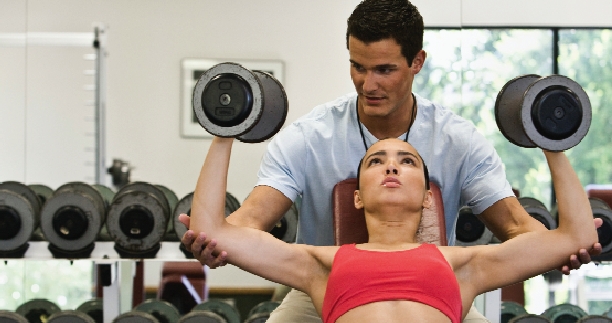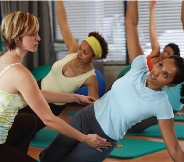Archive for August 2008
IDEA Code of Ethics for Personal Trainers
a. Remember that a personal trainer’s primary responsibility is to the client’s safety, health and welfare; never compromise this responsibility for your own self-interest, personal advantage or monetary gain.
Read MoreOnline Fitness Networks: A Link to Hybrid Training?
Hybrid training (online training coupled with face-to-face training) is often the perfect mix for those clients who prefer the conveniences of the Web yet require the guidance of a live trainer. New Web-based social networking platforms exist that can help trainers develop more hybrid programming.
Read MoreFine-Tuning Your Business
I have been blessed with 20 years of business, a great client base and a plethora of growing and learning experiences. Although I never feel that I have done all of my work or that I know as much as I need to, I have fine-tuned my in-home personal training business into one that fits…
Read MoreAdministrative Regulations
As a new business owner, you will need to comply with a number of administrative regulations and federal, state and local laws; for example, you will have to obtain various licenses, permits and insurance policies. Dealing with these requirements can seem overwhelming, but this guide can help you navigate the key tasks you will need…
Read MoreSurvey Results
Business Profile
Personal Training Programs
Yes, my company offers this
program, and I think it is:
Personal Training Programs
Yes, my company offers this
program, and I think it is:
Personal Training Equipment
Yes, my company has this
equipment, and I believe the use is:
IDEA Survey Data
To keep pace with the dynamism in this robust and rapidly evolving sector, this year IDEA revamped the annual Personal Training Programs & Equipment Survey. New questions were added to amass information about what goes on within training sessions, and old questions were revised to better understand individual trainers and trainer–entrepreneurs. The results allow us…
Read MoreNew Protocol for Parkinson’s Disease Clients?
Approximately 1.5 million Americans suffer from Parkinson’s disease (PD), with an estimated 60,000 new cases diagnosed each year (www
Read MoreCan Sweating to the Oldies Improve Brainpower?
Here’s yet another carrot to offer to your older-adult clients. According to a recent review of studies from the Netherlands, cardiovascular exercise may offer people over 55 a boost in brainpower. Around age 50, even healthy older adults begin to experience mild declines in cognition, such as sporadic memory lapses and decreased ability to pay attention. Evidence shows that regular
exercise contributes to healthy aging, but could the type of exercise a person performs influence cognitive fitness?
2008 IDEA Personal Training Programs & Equipment Survey Overview
To keep pace with the dynamism in this robust and rapidly evolving sector, this year we revamped the annual IDEA Personal Training Programs & Equipment Survey. New questions were added to amass information about what goes on within training sessions, and old questions were revised to better understand individual trainers and trainer-entrepreneurs. The results allow us to delve deeper into the training and business practices of IDEA members and afford you the opportunity to compare notes with colleagues on how you excel at your profession.
Read MorePublic Speaking
Have you ever wondered why public speaking is considered one of the top ways to develop and nourish your fitness business? The answer is simple—an experienced, talented speaker can get exposure to multiple prospects at one time, which makes public speaking a highly effective method of converting prospects into clients. It’s a sound business policy…
Read More2008 IDEA Personal Training Programs & Equipment Survey
To keep pace with the dynamism in this robust and rapidly evolving sector, this year IDEA revamped the annual Personal Training Programs & Equipment Survey. New questions were added to amass information about what goes on within training sessions, and old questions were revised to better understand individual trainers and trainer–entrepreneurs. The results allow us…
Read MoreYes, Resistance Training Can Reverse the Aging Process
Human aging is associated with a loss of muscle mass, a deficit in muscular strength and impairment in performing some activities of daily life. Typically, these changes start to occur about age 40 and progressively worsen with aging. Sarcopenia can be defined as natural, age-related loss of muscle mass, strength and muscle function. It is…
Read MoreThe Tour-Bus Trainer
Subject: Gregg Miele
Company: New York Strength & Conditioning Inc.
Career Orientation. Like many fitness professionals, Gregg Miele—owner of New York Strength & Conditioning Inc. in Hillburn, New York—fell in love with the fitness industry after achieving his own fitness-related successes.
Read MoreLook Before You Jump!
Clients—sports-minded and otherwise—can reap the benefits of a plyometrics program. Plyometric exercise is one of the most efficient ways to train and has “arguably the greatest transfer to sport application” (Barnes 2003). The jumping, hopping and bounding movements involved in plyometrics have been part of the human motion landscape throughout the ages. However, it wasn’t…
Read MoreHelp Fight Freshman Weight Gain
College marks the transition from adolescence to adulthood, a time for increasing independence, pursuing dreams, exploring personal and professional goals—and for too many, less exercise and more girth, which gives rise to a phenomenon known as the “freshman 15” weight gain (Racette et al. 2008). In fact, when nearly 20,000 college students were surveyed at…
Read MoreQ&A How do you deal with clients who incessantly talk about personal issues during training?
Clients sometimes become confused as to what a trainer can and cannot do for them. They may misinterpret a trainer’s ability, or willingness, to listen to them talk about personal issues. If you want your clients to exercise rather than talk, then there are a number of steps you can take: Create an Exercise Environment…
Read MoreFind It, Feel It, Move It
There is nothing quite like helping students understand a little bit more about how their bodies function. I like to introduce the concept of self-awareness in my classes. A typical warm-up, for example, focuses on specific muscle isolations, not just major muscle groups. This enables people to experience more fluid control in their movements. My motto is “Find it, feel it, and then move it.”
Read MoreChoosing a Specialty
Many fitness professionals take a shotgun approach to attracting clients. In essence, they try to be all things to all people. However, the best way to build a solid reputation and a steady client base is to become a specialist in a particular area of health and fitness. Discover why you need to narrow your market focus, how to choose an industry specialty and how to capitalize on your strategic decisions.
Read MoreHow to Be the Instructor Every Supervisor Wants
As a group fitness instructor, you seek out innovative choreography, purchase motivating music and put on your biggest smile in an effort to keep people coming back for more. While relating to participants may seem most pertinent, don’t neglect the critical connection with your group fitness director. Since this individual is typically the one who hires and fires, determines the class schedule and decides what equipment to purchase, it’s important to establish a positive and productive relationship with him or her.
Read MoreExtensive Experience out of the Gate
Amy Jamieson, MS, academic adviser and lecturer in the department of exercise and sport studies at the University of California, Santa Barbara (UCSB), works with the future of fitness every day. She helps guide students in the fitness instruction minor, a program that includes theory, training and practical components in a range of health, fitness…
Read More








